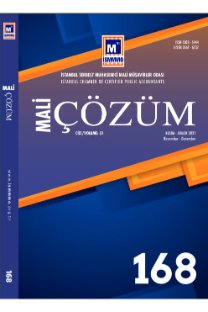Gerçeğe uygun değer ölçümünün uluslararası muhasebe standartları (SFAS) açısından incelenmesi
Finansal tabloların hazırlanmasında tarihi maliyet değerleri esas olup; tarihi maliyeti esas alan finansal tablolar, uzun süre teorisyenler, akademisyenler ve işletme uygulamacıları tarafından değişik yönlerden eleştirilmiştir. Bu eleştirilerin sonucu olarak, tarihi maliyet yerine, gerçeğe uygun değerin kullanılması teşvik edilmiştir.Gerçeğe uygun değer, belirli varlık ve yükümlülüklerin cari piyasa değeridir. Bu ölçütün kullanımı ile finansal tabloların değeri artacak ve gerçeğe daha uygun olacaktır. Bu nedenle; bu gelişmelere uyum sağlamak amacıyla, Uluslararası Muhasebe Standartları Kurulu (IASB) ve Amerikan Muhasebe Standartları Kurulu (FASB), değişik tarihlerde gerçeğe uygun değer ile ilgili olarak standartlarını yayınlamış veya güncellemiştir.
Assesment of fair value measurement from the view of international accounting standarts and statements of inancial accounting standards (SFAS)
Historical cost-based financial statements has been the center of significant controversy among theoreticians, academicians, and business practitioners in corporate for a long time form different view. As a result of the discussion, fair value was encouraged to use instead of historical cost. Fair value accounting is the practice of accounting that values certain assets and liabilities at their current market value. Using these criteria, value of the financial statements will be increased and more realistic. In order to adopt that improvements, International Accounting Standards Board (IASB) and Financial Accounting Standard Board (FASB) issued or updated their standards in connection with fair value at various dates
___
Adalet Komisyonu Türk Ticaret Kanununun Yürürlüğü ve Uygulama Şekli Hakkında Kanun Tasarısı Esas No: 1/1138, Karar No: 123. Ankara: Adalet KomisyonuAlexander, David, "Fair Value In IAS US GAAP", http://www.busi-ness.uiuc.edu/accountancy/research/vkzcenter/conferences/gottingen/pa-pers/Alexander.pdf (Erişim: 11 Mart 2009) s. 1-29.
Barckow, Andreas (2008), IFRS im Überblick Deloitte Touche Gmbh. September 2008
Campbell, Ronald L, Lisa A. Owens ve Diana R. Robinson (2008), "Fair Value Accounting From Theory to Practice", Strategic Finance, 90 (July 2008): 31-37.
FASB, Statement of Financial Accounting Standards No.157 "Fair Value Measurements", http://www.fasb.org (Erişim: 11 Mart 2009)
Fornaro, James M. ve Anthony T. Barbera (2007), "The New Fair Value Hierarchy", Review of Business. 27 (2007):4, 31-37.
Fuglister, Jayne ve Robert Bloom (2008), "Analysis of SFAS 157, Fair Value Measurements Starting Point for Making Difficult Valuations" The CPA Journal. 78 (January 2008): 1, 36-39.
Fujioka, Taka ve diğerleri (2008), "The State of Fair Value Accounting, Global Financial Crisis and Implications to Thailand" November 2008, http://papers.ssrn.com/sol3/papers,cfm?abstract_id=1303351 (Erişim: 20 Nisan 2009): 1-16.
Gökçen, Gürbüz, Başak Ataman Akgül ve Cemal Çakıcı (2006), Türkiye Muhasebe Standartları Uygulamaları. İstanbul: Beta Yayınları
Hertz, Robert H. ve Linda A. Macdonald, "Some Facts About Fair Value", FASB, Understanding the Issues (May 2008) http://www.fasb.org/ar-ticles&reports/uti fair value may 2008.pdf rFrisim: 11 Mart 2009): 1-2.
http://www.ey.com/global/content.nsf/Turkey-T/Reguletory-Changes (Erişim: 18 Nisan 2009)
http://www.iasplus.com/pastnews/2008jan.htm#ifrs3 (Erişim: 11 Mart 2009) King, Alfred M. (2009A), "Fair Value Is Dangerous For Cost Management", Cost Management, 23 (January-February 2009): 1, 41-47.
King, Alfred M. (2009B),, "Determining Fair Value", Strategic Finance, 90 (January 2009): 7, 27-32.
Krumwiede, Tim (2008), "Why Historical Cost Accounting Makes Sense", Strategic Finance, 90 (August 2008): 2, 33-39.
Ma, Cindy ve Andrew MacNamara (2009), "When Fair Value Is Not Fair", The CPA Journal, 79 (January 2009): 1, 10-11.
Penman, Stephen H. (2007), "Financial Reporting Quality: Is Fair Valu-e a Plus or a Minus?", Accounting and Business Research, Special Issue, Internetional Accounting Policy Forum (September 2007): 33-44.
PWC, Similarities and Differences - A Comparision of IFRS, US GAAP and Dutch GAAP, September 2004, http://www.pwcglobal.com/ gx/ eng/about/svcs/corpomtereporüng/DutchSandE)04.pdf (Erişim: 17 Ekim 2006): 1-125 SPK, "Sermaye Piyasasında Finansal Raporlamaya İlişkin Esaslar Tebliği Seri: XI, No:29", 9 Nisan 2008, http://www.spk.gov.tr
Terzi, Serkan, İlker Kıymetli Şen ve Filiz Bülbül (2007), "UFRS'nin Türkiye'de İlk Uygulaması İçin Açılış Bilançosu Hazırlanması", Mali Çözüm Dergisi 81 (Mayıs-Haziran 2007): 103-129.
TMSK (2008), Uluslararası Finansal Raporlama Standartları (IAS/IFR$) İle Uyumlu Türkiye Muhasebe Standartları. Ankara: Türkiye Muhasebe Standartlar Kurulu Yayınları
Tokay, Hüseyin, Ali Deran ve Rafet Aktaş (2005), "Uluslararası Muhasebe ve Finansal Raporlama Standartlarında Gerçeğe Uygun Değer Yaklaşımı ve Muhasebe Uygulamalarına Etkileri", XXIV. Türkiye Muhasebe Eğitimi Sempozyumu (Muğla Üniversitesi, 2005): 3-31.
Zingel, Harry (2008), International Financial Reporting Standards IFRS und IAS 2008: Grundbegriffe der internationalen: Rechnungslegung, http://www.zingel .de
- ISSN: 1303-5444
- Yayın Aralığı: Yılda 6 Sayı
- Başlangıç: 1991
- Yayıncı: İstanbul Serbest Muhasebeci Mali Müşavirler Odası
